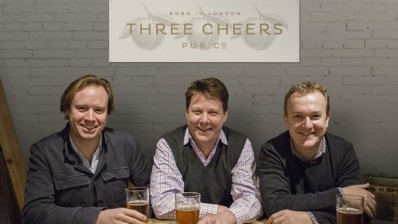Renaissance Pubs: 10 years and counting

When Peake, Reynolds and Fox bought their first pub - The Abbeville in Clapham - in 2003 they had no idea they'd be the owners of a six-strong self-funded pub group with an annual turnover of £7.7m 10 years later.
The friends, who had some experience of the industry through Battersea restaurant Cinnamon Cay, (which was sold in 2009) seemed to have entered the pub sector at the point at which its focus was shifting from being predominantly wet to food-led.
Food for thought
"It's amazing how the profile of the pub industry has changed in 10 years. It used to be about the odd gastropub which was like 'isn't that cool and exciting' but now it's just a huge topic of conversation," says Peake. "Everyone wants to know about their best local pub and where they go."
Serving quality food with provenance has been a major focus for Renaissance Pubs over the years, so much so that in 2009 the company invested in a Hampshire farm to ensure its supply chain and boost its sustainability credentials.
However, while food has inevitably been important to Renaissance Pubs' success, the trio, who continue to be hands-on by working from the pubs, rather than a head office, does not believe it is the sole reason.
Reynolds says: "With the smoking ban coming in everyone had to up their game and everyone had to start introducing food and everyone had to start investing in their sites to make them better, it's just been a very slow burn over the last 20 years, there's not one thing that's changed it [the industry] in that time its just a slow progression, people's jobs, people's lifestyles they have slowly changed and what they want has changed."
"Opening a pub as opposed to a restaurant did seem like a no-brainer at the time," he adds, "restaurants can be risky, suddenly sushi's not the in-thing anymore, whereas a pub caters for more occasions."
"A pub just occupies a place in people's minds in a way that a restaurant doesn't," adds Fox. "You'll go to a pub a few times a week, but you're less likely to go to a restaurant a few times a week and you won't pop in to a restaurant for a pint, which of course is what you do in a pub."
Celebrations
To mark 10 years of success, Renaissance has come up with a way to mark the milestone and which continues its focus on provenance as well as invests in its supply chain.
The company has created an own brand drinks range called TEN which includes a London-distilled gin, an ale made by nearby Sambrook's Brewery and a house red and white wine.
Seventy-two nine gallon kegs of the ale, which blends a Kentish hop recently discovered by the team (and called Renaissance) with First Gold, Challenger and WGV have been brewed by Duncan Sambrook, a friend of Reynolds, while the company has worked with SW4 London Gin and Charles Maxwell of Thames Distillers to produce about a year's worth of TEN London Gin.
The wines, which will become Renaissance's house offering, have been selected with the help of Claudio Manera of Araldica and come from the Piemonte region of Italy.
"We wanted to do something fun to mark our 10th anniversary and it was the obvious thing," says Peake.
"The opportunity was there and the fact that they [suppliers] are local and we're pubs, we thought it would be good to do our own beer and gin because it is a very English drink. It wasn't a tactical thing, it was just a bit of fun."
Celebrations also include a competition to give one customer free food for a decade while the head chef at each of the six pubs will receive a whole Gloucester Spot pig from Locks Drove Farm, where Renaissance has a stake, and be challenged to come up with the most creative pork dish to match Renaissance TEN wines.
Future
With celebrations for its 10 years in business underway, what does the next decade hold? Will it continue to grow and will it attempt a move across the river out of its South London heartland?
"We often look north of the river, whether it's North, West London or Central," says Reynolds, "but it's finding the right thing that's the problem".
"It's the competition for the sites," adds Fox, "everyone's after the good ones - there are so many more big operators out there, all well-funded often wanting to expand and it makes expansion that much more difficult. That's really the main reason why we don't have anything north of the river, it's not through want of trying."
In the meantime, the focus will remain on existing sites. The Tommyfield may see the addition of bedrooms above it, said Fox, while other sites will be refurbished as and when needed.
While other start-up pub groups have sought outside funding to help them expand, Renaissance's founders say that is something they are 'not actively seeking'. Fox said the company had looked at EIS funding a few years ago, but the 18 month window in which the investment had to be spent put them off.
The company has so far been self-funded with any extra cash going back into existing sites for refurbishments if needed and that is the approach the founders want to take for the next 10 years, although they are not closed off to options. "We are not planning on selling in the next 10 years that's for certain," confirms Reynolds.
"We are confident as we can be that we'll be around in the next 10 years," adds Peake. "We have always taken a long-term view on our decisions. Certainly when it comes to looking at materials for refurbishing somewhere you do tend to take a 10 year view because you want it to be strong and good enough to last that long. I would hope that we would still be around in the next 10 years."
Renaissance Pubs:
- The Abbeville, Clapham, 2003
- The Avalon, Clapham
- The Stonhouse, Clapham
- The Bolingbroke, Clapham
- The Tommyfield, Lambeth, (rebranded 2010)
- The Rosendale, Dulwich, 2011
Renaissance Pubs tips for success:
- Taking a hands-on approach. Operations director Reynolds in particular spends a large chunk of his time overseeing what is going on in the pubs and there is no head office, instead the management team works from the pubs.
- Promoting from within. All but two of the six pubs' general managers were recruited from within the estate "they know how we work and it's great if they can see their route up," says Fox. "We almost need to find more pubs to help give them a path to follow," says Peake.
- Careful expansion. Renaissance Pubs has taken a slow approach to expanding the business, which allows the business 'to get it right' says Fox.
- Keep it simple. "We are running pubs and we don't forget that," says Fox. "We make sure they are comfortable and have simple dishes on the menu."





















